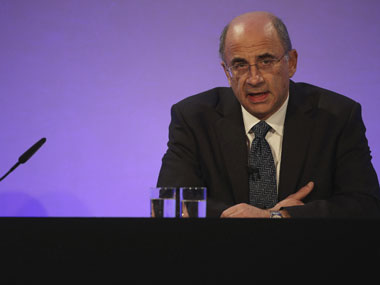“Don’t shoot the messenger. The media are only doing their job,’’ says the anchor before shooting off a question loaded with insinuation and accusation at the guest on the panel. We hear it so often on television. The guest squirms, aware that the question carries more malice than curiosity and that he is damned if he agrees with the anchor’s viewpoint and damned if he does not. He also knows that the messenger is being more than a messenger, clearly exceeding his mandate. Now the questions. What if the messenger goes crooked? What if the watchdog of democracy goes rabid? Shooting may not be the acceptable solution here but there’s certainly a case for taking him to the doctor for treatment. Since an alarming number of messengers suffer from the same ailment and since it’s obvious that in-house medication cannot be trusted, it is only proper that the job is handed over to an outsider. [caption id=“attachment_541517” align=“alignleft” width=“380”]  Justice Leveson unveiling the report of his year-long inquiry. Reuters.[/caption] Justice Lord Leveson, who led an eight-month inquiry triggered by the telephone hacking scandal involving British tabloid News of the World, implies as much in his report while calling for an independent regulator for the print media. He says over the decades the British newspaper industry has “wreaked havoc with the lives of innocent people” and “acted as if its code, which it wrote, simply did not exist.’’ He also underlines the “significant and reckless disregard for accuracy in the media’’ and the increasingly close relationship between the political parties and the press. How many of his observations apply to the Indian media? Too many, one is afraid. This should be reason for worry. The media’s credibility is eroding in the public perception in the country - forget the furious self back-patting over having uncovered great scandals. Anyone with some understanding of the profession would already know that reams of and reams of the so-called exposes were not usually the product of great investigative journalism. Some of it may even be unsubstantiated libel. The Zee-Jindal case, where two editors were arrested for alleged extortion, and which the news channel says was really about an attempt to muzzle critical stories about the Jindal group and attempted bribery, may not really be the exception to the rule. Boundaries between editorial and business departments have collapsed in many organisations - in some it has taken an institutionalised form with institutional justification. Revenue is important but when it starts invading editorial space, calling for compromises on the sanctity of content, it becomes dangerous. The trend is catching up. There are just many overlaps - journalism and revenue generation and journalism and politics being the most crucial ones - that have blurred the thick line between journalistic ethics and other considerations. Quality has taken a hit as the obvious consequence. It’s glaringly evident on television channels and in other media. Revenue is one aspect of the problem, and it’s a big one. If the owners of newspapers in the country are political players too - close to 70 percent of the newspapers are owned by people linked to politicians or politicians themselves - the ethical standards of the publications they run easily becomes suspect. There’s a lot of talk about paid news but what about news outlets where editors are also active members of political parties? Isn’t there a conflict of interest somewhere here? Isn’t there a possibility of news being twisted to suit the party the editor is loyal to? There’s no point pretending that this does not happen, particularly in vernacular media. There can be many shades of paid news and it’s only proper that we address that problem with the sense of urgency it demands. Add to that the growing arrogance in the media. It is reflected not only in the daily `inquisitions’ on prime time television shows but also in the casualness of fact-checking. There’s no tradition of media outlets apologising for errors or the hurt they could have caused to someone by indiscreet discussions. It’s not that people don’t notice it. That’s one of the reasons why the trustworthiness of the media is on a sharp decline. It is not surprising that civil society, besides taking up the political opposition’s space, has also taken some of the media’s. Both, in the public perception, have failed in discharging their duties. Sir Leveson’s report highlights this very erosion of core media ethics. “While press holds a privileged and powerful position in our society, its responsibilities have simply been ignored…A free press in a democracy holds powers to account. But, with a few honourable exceptions, the UK press has not performed that vital role in the case of its own power.’’ That could be the case with India too. Of course, regulation monitored by an independent body is required. The media won’t simply regulate themselves. There’s too much at stake. The competition is too high. All this calls for stretching the limits. It is not possible under a strict ethical standards regimen. But can they go on the way they are? No. They are living dangerously. The Leveson report should be a wake up call in India too.
Many of the observations of Justice Leveson apply to the Indian media. It should be a wake-up call.
Advertisement
End of Article


)

)
)
)
)
)
)
)
)



